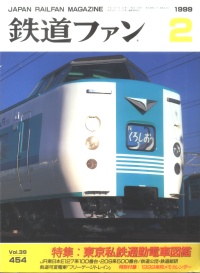 W
WThe Blue Ribbon Award is an award presented annually in Japan since 1958 by the Japan Railfan Club. It is awarded for railway vehicles that entered service in the previous year and were voted by members as being the most outstanding design of the year.
 W
WEkiben are a specific type of bento boxed meals, sold on trains and at train stations in Japan. They come with disposable chopsticks or spoons. Ekiben containers can be made from plastic, wood, or ceramic. Many train stations have become famous for their ekiben made from local food specialties (tokusanhin).
 W
WA hikyō station , or "secluded station," is the Japanese language name for railway stations that are little used and isolated. Photographers and rail fans visit the stations to take photos of historical stations and trains or photos of nature.
 W
WJapan Railfan Magazine is a Japanese-language monthly magazine for railfans covering the mainly Japanese railways published by Koyusha. It has been published in Japan since 1961. Issues go on sale on the 21st of each month, two months before the cover month. Each copy sells for between ¥1,100 and ¥1,200 depending on the number of pages. The magazine reports on railway prototypes, complete with technical plans, photos, maps, graphs, and tables.
 W
WThe Laurel Prize is an award presented annually in Japan since 1961 by the Japan Railfan Club. It is awarded for railway vehicles that entered service in the previous year and voted by the selection committee as having the most outstanding functional and design features.
 W
WMasuzushi (鱒寿司) is a kind of Japanese ekiben boxed meal sold on trains and train stations in Japan. It is a type of oshizushi and a well-known souvenir of Toyama.
 W
WA pusher is a worker who pushes people onto the mass transportation vehicle at a crowded stop during the rush hours.
 W
WPointing and calling is a method in occupational safety for avoiding mistakes by pointing at important indicators and verbally calling out their status. It is particularly common on Japanese railways, where it is referred to as shisa kanko (指差喚呼), shisa kakunin kanko (指差確認喚呼) or yubisashi koshō (指差呼称); and in China, where it is called "指差呼唤". Gesturing at and verbalizing these indicators helps with focus. The method was first used by train drivers and is now commonly used in Japanese industry. It is not common in other countries, though it is used in the New York City Subway system, Toronto's TTC subway and GO Transit and many systems built in Chinese standards, for example Addis Ababa-Djibouti Railway. It is recommended by the Japan Industrial Safety and Health Association, and a part of railway management regulations in China.
 W
WRessha Sentai ToQger is a Japanese television series, a Tokusatsu drama of the 38th installment in Toei Company's Super Sentai metaseries, following Zyuden Sentai Kyoryuger. It premiered on TV Asahi affiliates on February 16, 2014, joining Kamen Rider Gaim and later, Kamen Rider Drive in the Super Hero Time programming block, and it ended on February 15, 2015. The series has a train motif, and unlike previous series where the heroes are named after colors, the heroes in ToQger are numbered and regularly swap colors during battle.
 W
WTama was a female calico cat who gained fame for being a station master and operating officer at Kishi Station on the Kishigawa Line in Kinokawa, Wakayama Prefecture, Japan.
 W
WTetsuko no Tabi is a Japanese nonfiction manga series authored by Hirohiko Yokomi and illustrated by Naoe Kikuchi. The manga was serialized in Shogakukan's seinen manga magazine Monthly Ikki between 2001 and 2006. A thirteen-episode anime television series adaptation by Group TAC was broadcast in 2007.
 W
WTsukidate no Satsujin is a Japanese manga series written by Yukito Ayatsuji and illustrated by Noriko Sasaki. It was serialized in Shogakukan's Monthly Ikki from December 2004 to April 2006, with its chapters collected in two wide-ban volumes.
 W
WWomen-only passenger cars are railway or subway cars intended for women only. They are a result of sexual segregation in some societies, but also can result from attempts to reduce sexual harassment and assault such as groping.